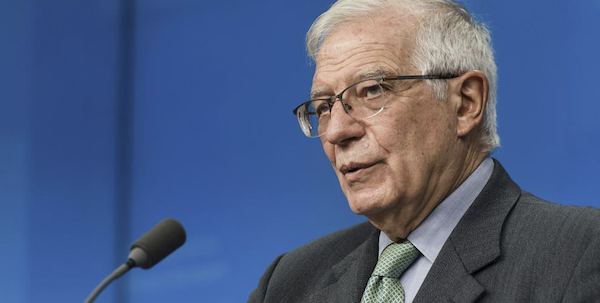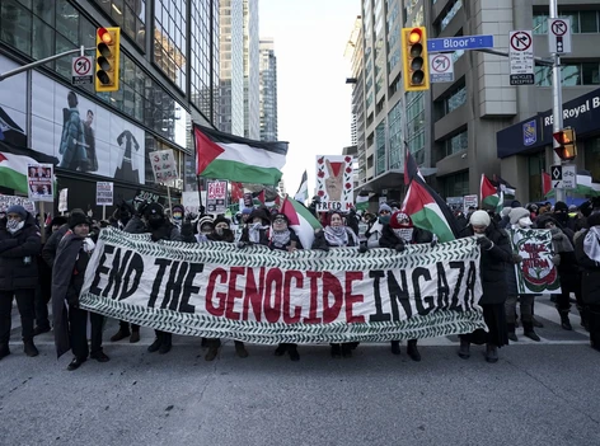
Josep Borrell, the EUís high representative, said he was in contact with the United Nations to provide humanitarian assistance. - Copyright Geert Vanden Wijngaert/Copyright 2021 The Associated Press. All rights reserved
The European Union has agreed to expand its already-long list of sanctions against the administration of Belarusian President Alexander Lukashenko in a bid to contain the worsening crisis at the blocís eastern borders.
The decision has gained the political backing of the 27 member states. A detailed list of targets, which can include both individuals and entities, will be developed over the coming days.
Brussels accuses Lukashenko of orchestrating a hybrid attack against the bloc in retaliation to the numerous penalties imposed in the aftermath of the disputed 2020 Belarusian presidential election.
The bloc believes Belarusian authorities are luring people from the Middle East and African countries all the way to Minsk airport to then send them towards the borders with Poland, Lithuania and Latvia.
Belarusian airline Belavia, which is state-owned, is seen as a key enabler behind the complex plot. The European Commission is currently gathering evidence to determine if other carriers are also involved in human trafficking.
President Lukashenko continues to deny any responsibility.
Foreign affairs ministers from the 27 member states met in Brussels on Monday to discuss the ongoing situation and agreed to slap Belarus with a fifth raft of sanctions.
So far, the bloc has targeted 166 individuals and 15 companies from Belarus across four different series of sanctions, which include some of Lukashenkoís family members.
This time, the Council voted to widen the blacklisting criteria in order to penalise the people and organisations believed to be exploiting migrants and facilitating Minsk-bound flights.
"Sanctions are always effective because they affect people, their wealth and their capacity of movement," said Josep Borrell, the EUís high representative, ahead of the meeting.
Borrell, who called Lukashenkoís actions "inhuman" and "deplorable", said the new package of sanctions will punish "airlines, travel agents and everybody involved in this illegal push of migrants".
He noted most flights headed to Minsk had been stopped thanks to the EUís diplomatic outreach. In recent days, EU Commission Vice-President Margaritis Schinas has visited Lebanon, the United Arab Emirates and Iraq and urged national officials to stop flights headed to Belarus.
The Iraqi government will organise the first repatriation flight later this week "on a voluntary basis". Cham Wings Airlines, a private Syrian carrier, has suspended all flights to the Belarusian capital, while Turkey has stopped the sale of plane tickets to Iraqi, Syrian and Yemeni citizens who are attempting to reach Minsk from a Turkish airport.
"Things are becoming under control, but we have to provide humanitarian assistance to these people [migrants trapped in the border] and to prevent any kind of hybrid attack against the European Unionís borders," Borrell declared, adding he has been in touch with the United Nations to provide the necessary humanitarian aid.
Gabrielius Landsbergis, Lithuaniaís foreign affairs minister, said the fifth series of penalties should be "broader" than the previous four packages and force planes to land "nowhere in Belarus".
"We need to make Minsk airport a no-fly zone," Landsbergis said.
His Spanish counterpart, José Manuel Albares Bueno, argued the response against Belarus should be "comprehensive, firm, clear" and done in solidarity with the member states on the frontline.
It remains to be seen how far Brussels will be willing to go with the new coercive measures and how effective these will be in practice. Yauheni Preiherman, founder and director of the Minsk Dialogue initiative, thinks the bloc lacks the necessary economic sway inside Belarus to bend the regime.
"Unfortunately, what weíve been observing in the last year or so is that, instead of diplomacy, the EU has only be talking sanctions," Preiherman told Euronews.
"And again, unfortunately, this has only lead to all these negative repercussions. So I think what has to be done is proper diplomacy. There has to be adults in the room, including on the EU side."
Further deterioration
Although the border crisis has been unfolding since early summer, the situation took a dramatic turn last week when hundreds of new arrivals showed up at the Belarus-Poland frontier, mainly at the Kuźnica crossing point, with the goal of travelling to Germany.
Poland claims over 15,000 migrants have been recently flown to Minsk and sent to the countryís border. As a result, Warsaw has deployed thousands of soldiers to prevent illegal crossings.
The situation has deteriorated to the point of being described as a humanitarian crisis, with sub-zero temperatures causing multiple cases of hypothermia. At least ten people have died in the area since late summer.
Access to the area is restricted to journalists and civil society, making reports hard to verify.
The EU, the US and NATO have strongly condemned Lukashenkoís scheme and continue to demand an immediate end to the state-sponsored tactics of weaponising migrants.
Ursula von der Leyen, President of the European Commission, was among the first leaders to call for renewed sanctions against Belarusian officials and third-country airlines involved in human trafficking.
For his part, Russian President Vladimir Putin has denied any supportive role in Lukashenkoís plot and has offered his help to mediate in the crisis.
Putin publicly dismissed the Belarusian leader when he publicly threatened to cut off EU-Russia gas supplies. Gazprom, the Russian energy corporation, is the countryís largest company by revenue and is responsible for 25% of the EUís gas supply.
The European Union does not have any direct contact with Lukashenko because it considers him an illegitimate ruler who stayed in power following elections that were deemed neither free nor fair.
Borrell, however, has spoken with Belarusian Foreign Affairs Minister Vladimir Makei and asked for assistance in the repatriation of stranded migrants and the provision of humanitarian aid.
"Frankly speaking, I donít believe Lukashenko is doing what he is doing without strong support from Russia," the High Representative said at the end of the ministerial meeting on Monday.
"This crisis has been artificially created and should not distract [us] from the internal situation in Belarus with large-scale violations of human rights," he added. "Dialogue will be re-established when the regime starts respecting human rights from people at home and abroad."
Meanwhile, NATO officials are waiting to see if any of the affected countries - Poland, Lithuania or Latvia - decides to trigger Article 4, a provision that launches consultations about military action when the "territorial integrity, political independence or security" of a NATO member state is threatened.
"Itís up to any NATO ally to invoke article 4," said NATO Secretary-General Jens Stoltenberg.
"I think the important thing is that we consult closely already between NATO allies and we also work closely with the EU."
LINK: https://www.ansarpress.com/english/23897
TAGS:






























 Farkhunda Buried, Ghani Appoints Fact-Finding Team
Farkhunda Buried, Ghani Appoints Fact-Finding Team




